Donald Trump appears in court in New York for his civil trial for business fraud
Seeking re-election in 2024, the Republican has called the trial a farce, but it could cost him $250 million and strip him of his empire’s most important assets
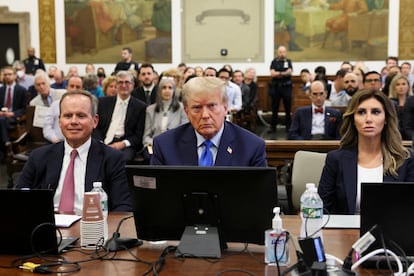

On Monday, former president Donald Trump appeared before a Manhattan court for a civil fraud trial. The first hearing of the case — which was initiated in September 2022 by the New York attorney general, Letitia James, against the tycoon, two of his eldest sons, Donald Jr. and Eric, and several executives of the organization — started promptly at 10 a.m., half an hour after the former president arrived amid a large security deployment and the usual swarm of cameras. Trump was accompanied by his two sons and several business associates. “[This trial] is a continuation of the single greatest witch hunt of all time,” the politician said before entering the courtroom. “We have a great company. I built a great company. It’s tremendous. It’s got some of the greatest real estate assets in the world. And now I have to go in before a rogue judge.”
Last week, the judge hearing the case, Arthur Engoron, ruled that the former president is liable for fraud for inflating the value of his properties on official documents for over a decade to cheat banks, insurers and others out of profits. Attorney General James, a Democrat whom the former president accuses of engaging in a political witch hunt, seeks $250 million [about €238 million] in damages, and proposes prohibiting the Trump family from serving as directors in New York, and barring the company, the Trump Organization, from operating there for five years. Trump is not scheduled to testify for several weeks, and the trial will last at least until Christmas. His voluntary appearance on Monday, however, is a radical departure from previous subpoenas, which he refused to honor.
Although this is a civil process (Trump doesn’t run the risk of imprisonment) and the penalty requested by the prosecution is affordable for him, the scope of the measures imposed by Judge Engoron seriously undermines Trump’s reputation as a businessman; his image as a self-made man formed the basis of his political career.
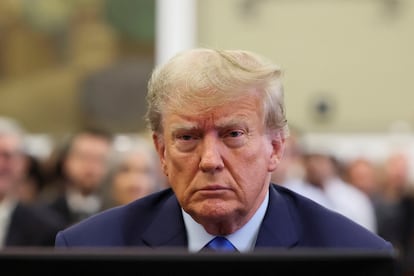
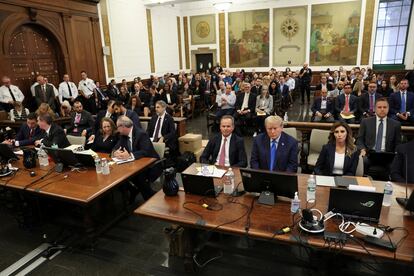
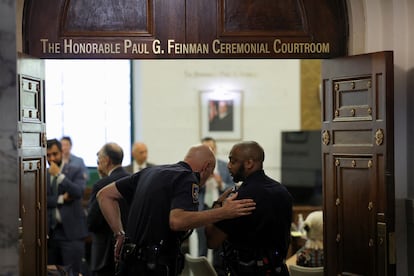
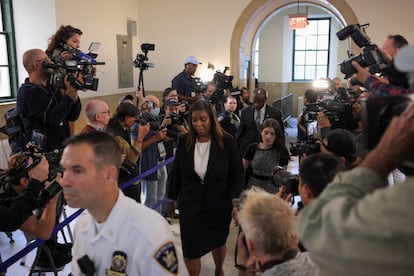
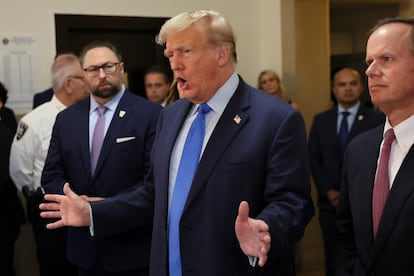
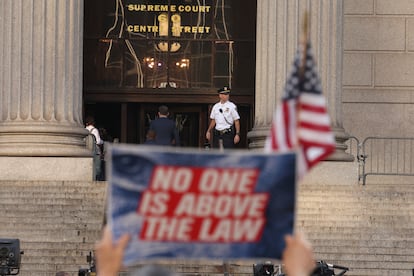
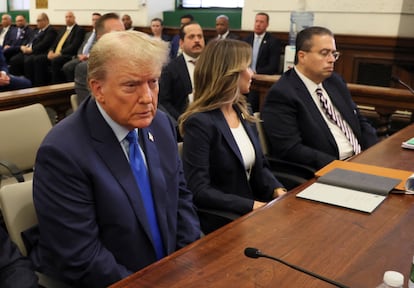
Engoron could remove control of important Trump organization assets, starting with the symbolic Trump Tower in the heart of Manhattan, where the Republican started his political career with a cinematic image of success: accompanied by his wife Melania, he went down the escalator at the entrance of the building, which is covered in chrome, gold, and marble; the family home is on the top three floors of the building (the residence would also be included in the sanction). In addition, Trump could lose a Wall Street office building, golf courses and a country estate. The case only affects a handful of the approximately 500 entities in Trump’s portfolio, but they are some of the most important ones.
The trial will scrutinize his business practices and whether the fortune that Trump boasts of having acquired by dint of tenacity and ambition is actually built on the original sin of lying. In terms of his possible reelection as president in 2024 — he is the presumptive Republican nominee — this civil case does not have the political relevance of some of the four criminal cases against him. Nevertheless, the possibility of losing control of Trump Tower and the other properties has infuriated the Republican candidate. Trump denies fraud and claims that James and Engoron are undervaluing assets like his Mar-a-Lago residence in Florida; he also calls the case a “farce.” His lawyers contend that the information on the official documents doesn’t matter, because they include a disclaimer that says they are not 100% reliable. On Monday, one of Trump’s attorneys, Christopher Kise, insisted that the financial disclosures are “entirely legal.” “[The Trump Organization] is one of the most highly successful brands in the world, and he has made a fortune literally being right about real estate investments,” Kise said. “There was no intent to defraud, there was no illegality, there was no default, there was no breach, there was no reliance from the banks, there were no unjust profits, and there were no victims,” Kise said.
In messages posted overnight on his Social Truth network, Trump stressed that he was going to court “to fight” for his “name and reputation” and called for James and Engoron to resign.
The former president built his political career on his credibility as a multimillionaire and master negotiator. He also promoted that image in his 1987 book The Art of the Deal, which was part memoir and part business advice manual and served to boost his personal brand: his name. He further cultivated that image with other marketing and visibility initiatives, including the reality show The Apprentice, which served as his springboard to politics in 2016.
In addition to Trump’s two eldest sons, witnesses called to testify at the fraud trial include several of the Trump Organization’s executives; Michael Cohen, Trump’s former fixer turned enemy; and Allen Weisselberg, who was CFO of the Trump Organization for decades and recently pleaded guilty to tax fraud to protect his boss from culpability. Weisselberg was sentenced to five months in jail last January. The Trump Organization was convicted of the same charge in December and ordered to pay a $1.6 million penalty a month later.
Sign up for our weekly newsletter to get more English-language news coverage from EL PAÍS USA Edition
Tu suscripción se está usando en otro dispositivo
¿Quieres añadir otro usuario a tu suscripción?
Si continúas leyendo en este dispositivo, no se podrá leer en el otro.
FlechaTu suscripción se está usando en otro dispositivo y solo puedes acceder a EL PAÍS desde un dispositivo a la vez.
Si quieres compartir tu cuenta, cambia tu suscripción a la modalidad Premium, así podrás añadir otro usuario. Cada uno accederá con su propia cuenta de email, lo que os permitirá personalizar vuestra experiencia en EL PAÍS.
¿Tienes una suscripción de empresa? Accede aquí para contratar más cuentas.
En el caso de no saber quién está usando tu cuenta, te recomendamos cambiar tu contraseña aquí.
Si decides continuar compartiendo tu cuenta, este mensaje se mostrará en tu dispositivo y en el de la otra persona que está usando tu cuenta de forma indefinida, afectando a tu experiencia de lectura. Puedes consultar aquí los términos y condiciones de la suscripción digital.








































